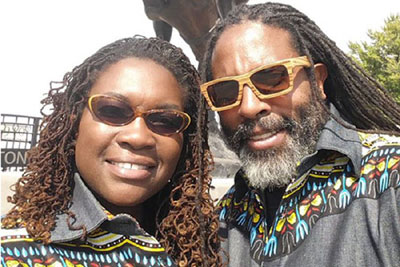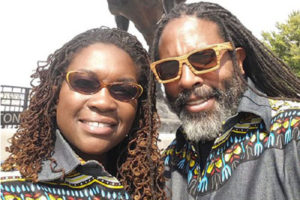

By Guest Columnist Erious Johnson, Jr., and Nkenge Harmon Johnson
Stories are flooding the news cycle of callous people calling police on African Americans having a barbecue in a park, asking to see a manager at a Waffle House, slowly playing a round of golf, and sitting in a Starbucks. Hence the hashtag “Living While Black.” It connotes someone who is minding their own business, doing ordinary things, only to have the police called on them, usually by a white person who is offended by a Black person being in a certain place, at a certain time, doing whatever they had the right to be doing.
While it is catching the nation’s attention, this upsetting phenomenon is not new. Racism, entitlement, and privilege rely on the government sanctioned power to enforce one’s opinion of superiority over another. This sentiment formed the basis for slavery, which was solidified by the fugitive slave provisions in the United States Constitution. Then, Black Codes and Jim Crow accompanied newly freed slaves into emancipation. And in 1857, United States Supreme Court Chief Justice Roger B. Taney ruled that African Americans “had no rights which the white man was bound to respect.”
People subjected to these shocking encounters are left humiliated. They are uncertain of their ability to live in peace in their own communities. They have no redress to recoup their time, money, or dignity. For example, a neighbor in Ohio called police on a 12-year-old boy who was working his own lawn mowing business.
The young entrepreneur lost time that he could have used to mow other lawns and earn more money.
He also learned that police do not serve all citizens equally. In Oregon, a woman called the sheriff’s office on House District 51 State Representative Janelle Bynum for knocking on her constituents’ doors.
These demoralizing and potentially dangerous encounters with law enforcement do not affect Black people alone. Campus police were called on two Native American teens while attending a Colorado State University tour, which they had driven seven hours to attend.
Thanks to mobile phone cameras and social media, people see that these are not isolated incidences. Sometimes the callers are exposed and publicly shamed. Some have even lost jobs because of their bias. However, existing laws such as abuse of process, malicious prosecution, intentional infliction of emotional distress, and defamation do not address malicious callers that waste police resources and harass
innocent people.
A new law called “Malicious Summoning” would deter racist cop-callers, without burdening taxpayers. It is narrow in scope, yet broadly useful. The statute could appear as:
The summoning of a law enforcement officer, to a person, regardless of the summoner’s belief of necessity, intended to: Infringe that person’s rights as guaranteed by the U.S. and Oregon Constitutions; Unlawfully discriminate against that person; Harass or annoy that person; Institute an unnecessary “legal process,” as that term is defined in 22 CFR SS 92.84, against that person; or Damage that person’s Reputation or standing within the community, or Financial, economic, consumer, or business prospects or interests.
It is a versatile concept. It contains a mens rea element, legalese for “state of mind,” an essential protection for the innocent. It could be used civilly as an intentional tort, or criminally as a misdemeanor or a violation akin to “initiating a false report.”
Malicious Summoning could also be placed amongst Oregon’s civil rights statutes, covering public accommodations.
The law is fiscally conservative and supports Oregon’s economic goals. First, it will not require additional government employees or bureaucratic hours. In fact, it would free police officers to attend to actual crime prevention and public safety duties. Next, all members of the public, including tourists, will feel safe to spend their time and money in local establishments. Finally, the concept is a way to show a different face to the nation: Oregon is addressing its number one ranking amongst all states for reported hate crimes.
A statute against malicious summoning will not cover every instance. But it would have a broad application. It could be applied to the waiter threatened by a customer with calling immigration enforcement, a non-gender conforming person trying to use the bathroom of their choice, or a houseless family sitting in a neighborhood park.
There is an abuse of power dynamic going on in our society. Laws are designed to balance power. This response to racist and spiteful cop-callers is a step toward sharing power and creating a safer community.
— Erious Johnson, Jr., is an attorney, writer and speaker. He served as the first director of civil rights for the Oregon Department of Justice. Nkenge Harmon Johnson is president of the Urban League, an Oregon and Southwest Washington civil rights and economic justice organization. She frequently speaks about investing tax dollars equitably and encourages public-private pathways to build a better community for all. Contact them at @EriousEsq and @TrueNkenge.





Be the first to comment